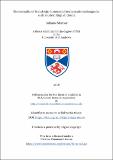Files in this item
The textuality of friendship: homosocial hermeneutic exchanges in early modern English drama
Item metadata
| dc.contributor.advisor | Hutson, Lorna | |
| dc.contributor.advisor | Davis, Alex | |
| dc.contributor.advisor | Rauer, Christine | |
| dc.contributor.author | Mentzer, Julianne | |
| dc.coverage.spatial | ix, 225 p. | en_US |
| dc.date.accessioned | 2018-09-11T14:59:01Z | |
| dc.date.available | 2018-09-11T14:59:01Z | |
| dc.date.issued | 2018-12-07 | |
| dc.identifier.uri | https://hdl.handle.net/10023/16009 | |
| dc.description.abstract | My thesis argues that textually embedded intimacy and exclusivity between men opens up ethical problems concerning the use of education and persuasive powers—the ability to reconfigure vice as virtue, to argue a case for transgressions, and to navigate political, economic, and social spheres for personal self-advancement. My argument is based first on the proposition that masculine elite friendship in the early modern period is situated in specific pedagogical practices, engagement with particular rhetorical manuals and classical texts, and manipulation of texts which determine the affectionate, ‘textual’, nature of these relationships. From this, I propose, second, that a hermeneutic process of rhetorical and poetic composition and exclusionary understanding is embedded within these textual relationships. From these two propositions, I analyse the textual surface of homosocial relationships in order to ask questions about ethical dilemmas concerning the forms of power they represent. How can an enclosed system of affection be useful for political, social, or financial advancement by making a vice (self-interest) of a virtue (fidelity), a dubious idea in the early modern period? How are homosocial networks developed and depicted through an engagement with their own textuality? Are they shown as transgressive and dangerous in further marginalizing those who are not privy to the system of textual exchange between men? The creation of homosocial male friendships is predicated on the idea that there are shared texts and methodologies for internalizing ideas from classical sources (imitatio) and for using these as starting points for the creation of arguments (inventio) to suit social, political, and even domestic situations. I focus on fictitious relationships developed in early modern English drama—as playwrights represent masculine discourse, textual knowledge, and rhetorical techniques. The friendships and fellowships in these dramatic productions contain questions about the use of masculine networks in socio-political and economic navigation. | en_US |
| dc.language.iso | en | en_US |
| dc.publisher | University of St Andrews | |
| dc.rights | Attribution-NonCommercial-NoDerivatives 4.0 International | * |
| dc.rights.uri | http://creativecommons.org/licenses/by-nc-nd/4.0/ | * |
| dc.subject | Male friendship | en_US |
| dc.subject | Friendship | en_US |
| dc.subject | Early modern | en_US |
| dc.subject | Renaissance | en_US |
| dc.subject | Drama | en_US |
| dc.subject | Homosocial intimacy | en_US |
| dc.subject | Early modern education | en_US |
| dc.subject | Textuality | en_US |
| dc.subject.lcc | PR646.M4 | |
| dc.subject.lcsh | English drama--Early modern and Elizabethan, 1500-1600 | en |
| dc.subject.lcsh | Male friendship in literature | en |
| dc.title | The textuality of friendship: homosocial hermeneutic exchanges in early modern English drama | en_US |
| dc.type | Thesis | en_US |
| dc.contributor.sponsor | Ewan & Christine Brown Postgraduate Scholarship in the Arts and Humanities | en_US |
| dc.type.qualificationlevel | Doctoral | en_US |
| dc.type.qualificationname | PhD Doctor of Philosophy | en_US |
| dc.publisher.institution | The University of St Andrews | en_US |
| dc.rights.embargodate | Embargo period has ended, thesis made available in accordance with University regulations | en |
| dc.identifier.doi | https://doi.org/10.17630/10023-16009 |
The following licence files are associated with this item:
This item appears in the following Collection(s)
Except where otherwise noted within the work, this item's licence for re-use is described as Attribution-NonCommercial-NoDerivatives 4.0 International
Items in the St Andrews Research Repository are protected by copyright, with all rights reserved, unless otherwise indicated.


